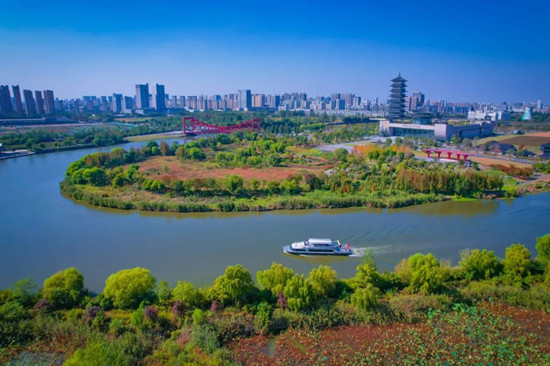
An aerial view of Sanwan Wetland Park alongside the Grand Canal in Yangzhou, Jiangsu province. The park has become a landmark in protecting wetland ecology since it opened in 2017. [Photo provided to chinadaily.com.cn]
Province invests in ecological, environmental projects
Wang Liang, who has lived near Yuzui Park in Wuxi, Jiangsu province, for decades, used to loathe summer, when he largely avoided visiting the park.
With a name that translates as "fish mouth park", the place used to be the site of a fish market selling fresh aquatic produce from Taihu Lake in the southern part of the Yangtze River Delta. However, the smell from the market was particularly bad in summer.
"It was not only the smell that bothered you. On rainy days, water ran everywhere in the market, so you didn't know where to set foot. The noise, the smell and the sewage made the place unbearable," said Wang, 60.
In 2021, an ecological restoration project was launched at the site to give local residents a modern wetland park with a clean lake and a variety of plants. Water birds now fly over the lake from time to time.
To create a sustainable ecological system, the newly-dug lake was connected to Taihu Lake to obtain more fresh water. Fish, shrimps, scallops and algae were introduced to the new lake for water self-purification.
Wu Yong, deputy manager of Jiangsu Jiangda Ecological Environment Technology Co, said: "Water ecology restoration involves far more than improving the quality of water. The landscape design should contain water features to provide a more harmonious experience between humans and nature."
The 18.4-hectare park now boasts a 460-meter-long boardwalk that stretches into the lake, a lakeside pavilion, and colorful footpaths winding their way through the plants. Many residents living nearby are now frequent visitors to the park.
In Nanjing, capital of Jiangsu, authorities in the city's Pukou district have invested about 300 million yuan ($42 million) in recent years on ecological restoration work on a 16-kilometer stretch of the Yangtze River that used to be home to the shipbuilding industry.
Yang Qingsong, a member of the Communist Party of China's working committee in Pukou's Qiaolin community, said a section of the Yangtze in the district used to be lined with shipbuilding factories. Locals complained constantly about the noise from machinery and also about water and air pollution resulting from ships being painted, and from rust removal work.
More than 300 sets of abandoned machinery have now been dismantled in the district, including gantry cranes and crushers. Some 1.7 million square meters of green land has been restored along an 11-km stretch of the river banks, which used to be covered in cement, sand and gravel.
"Work on Donglongshan and Simahe parks has been completed along the Yangtze, and the former shipbuilding belt has become a tourist attraction," Yang said.